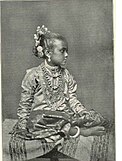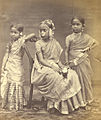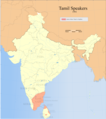Portal:Tamils
The Tamils portal
The Tamil people, also known as Tamilar (Tamil: தமிழர், romanized: Tamiḻar, pronounced [t̪amiɻaɾ] in the singular or தமிழர்கள், Tamiḻarkaḷ, [t̪amiɻaɾɡaɭ] in the plural), Tamilians, or simply Tamils (/ˈtæmɪlz, ˈtɑː-/ TAM-ilz, TAHM-), are a Dravidian ethnolinguistic group who natively speak the Tamil language and trace their ancestry mainly to India's southern state of Tamil Nadu, to the union territory of Puducherry, and to Sri Lanka. The Tamil language is one of the world's longest-surviving classical languages, with over 2000 years of Tamil literature, including the Sangam poems, which were composed between 300 BCE and 300 CE. People who speak Tamil as their mother tongue and are born in are considered Tamils.
Tamils constitute 5.9% of the population in India (concentrated mainly in Tamil Nadu and Puducherry), 15% in Sri Lanka (excluding Eelam Moors), 7% in Malaysia, and 5% in Singapore. From the 4th century BCE, urbanisation and mercantile activity along the western and eastern coasts of Tamilakam -- what is today Kerala and Tamil Nadu -- led to the development of four large Tamil empires, the Cheras, Cholas, Pandyas, Pallavas, and velirs and a number of smaller states, all of whom were warring amongst themselves for dominance. The Jaffna Kingdom, and vanni chieftaincies inhabited by Eelam Tamils, was once one of the strongest kingdoms of Sri Lanka and controlled much of the north of the island. (Full article...) Selected article -Sri Lankan Tamil nationalism is the conviction of the Sri Lankan Tamil people, a minority ethnic group in the South Asian island country of Sri Lanka (formerly known as Ceylon), that they have the right to constitute an independent or autonomous political community. This idea has not always existed. Sri Lankan Tamil national awareness began during the era of British rule during the nineteenth century, as Tamil Hindu revivalists tried to counter Protestant missionary activity. The revivalists, led by Arumuga Navalar, used literacy as a tool to spread Hinduism and its principles. The reformed legislative council, introduced in 1921 by the British, was based on principles of communal representation, which led the Tamils to realize that they were the minority ethnic group and that they should be represented by a member of their own community. It was under this communal representation that Tamil national awareness changed to national consciousness—a less passive state. They formed a Tamil political party called the All Ceylon Tamil Congress (ACTC). In the years leading to Sri Lankan independence, political tension began to develop between the majority Sinhalese and minority Tamil communities as the ACTC, citing the possibility of the majority Sinhalese adopting a dominant posture, pushed for "fifty-fifty" representation in parliament. This policy would allot half the seats in parliament to the Sinhalese majority and half to the minority communities: Ceylon Tamils, Indian Tamils, Muslims and others. (Full article...)General imagesSelected biography -Muthuvel Karunanidhi (3 June 1924 – 7 August 2018) was an Indian writer and politician who served as Chief Minister of Tamil Nadu for almost two decades over five terms between 1969 and 2011. He is popularly referred to as Kalaignar (Artist) and Mutthamizh Arignar (Tamil Scholar) for his contributions to Tamil literature. He had the longest intermittent tenure as Chief Minister of Tamil Nadu with 6,863 days in office. He was also a long-standing leader of the Dravidian movement and ten-time president of the Dravida Munnetra Kazhagam political party. Karunanidhi has the record of never losing an election to the Tamil Nadu Assembly, having won 13 times since his first victory in 1957. Before entering politics, he worked in the Tamil film industry as a screenwriter. He also made contributions to Tamil literature, having written stories, plays, novels, and a multiple-volume memoir. Karunanidhi died on 7 August 2018 at Kauvery Hospital in Chennai after a series of prolonged, age-related illnesses. Karunanidhi was born in the Tamil Nadu village of Thirukkuvalai on 3 June 1924. His parents were from the Isai Vellalar caste, a caste of musicians that perform at temples and other social gatherings. Growing up in a caste-ridden culture, Karunanidhi was learned about the crippling circumstances that arose from being born into a low caste. When he was 14, he formed a student movement against the imposition of Hindi as India's national language during the Anti-Hindi agitation of 1937–40. This served as a forerunner to Karunanidhi's wider anti-Hindi demonstrations in 1965. As a high school student, Karunanidhi created the Tamil Nadu Tamil Manavar Mandram, the Dravidian Movement's first student wing. He also started a news paper during his school days, which grew into the Murasoli, the DMK's official publication. Karunanidhi began participating in theatrical productions at a young age, including composing plays. Later on, he started writing for movies. As a writer, he wrote screenplays, historical novels, screenplays, biographies, poems and novels. He utilised his writing to propagate reformist ideals effectively. He wrote the script and dialogue for M.G. Ramachandran's (MGR) maiden film as a hero, Rajakumari. He also composed the dialogue for Sivaji Ganesan's debut film, Parasakthi. He was critical of organised religion and superstition. He was an atheist and a self-described rationalist. (Full article...)CategoriesTopicsTamil People Countrywide: India • Sri Lanka • Canada • Malaysia • Singapore • South Africa • England Related Ethnic Groups: Brahui • Gond • Kannadiga • Khonds • Kodava • Oraon • Malayali • Telugus • Tuluvas Related indigenous Groups: Badagas • Toda • Kuruba
See also: List of Tamil people, Tamil script, Tamil Script Code for Information Interchange Related portalsWikiProjectsThings to do
Associated WikimediaThe following Wikimedia Foundation sister projects provide more on this subject:
Discover Wikipedia using portals |































































